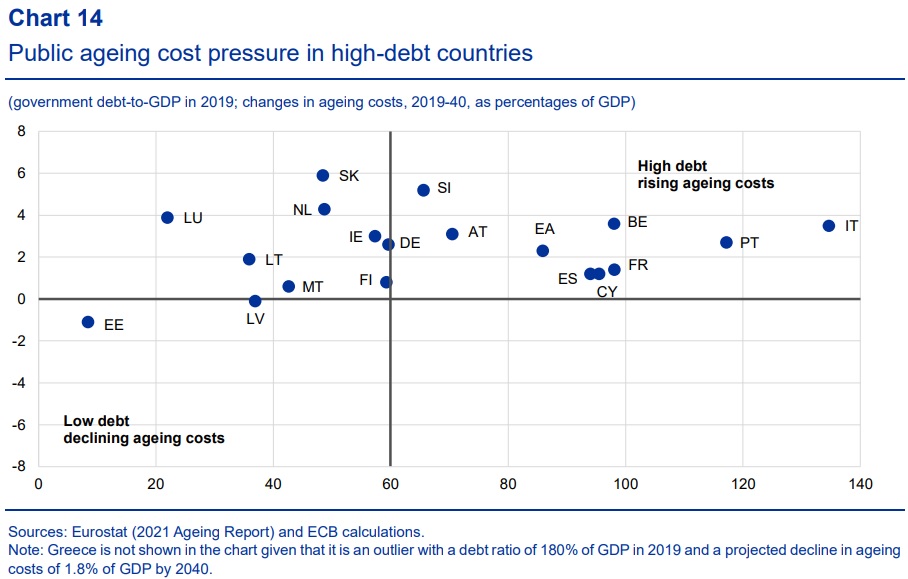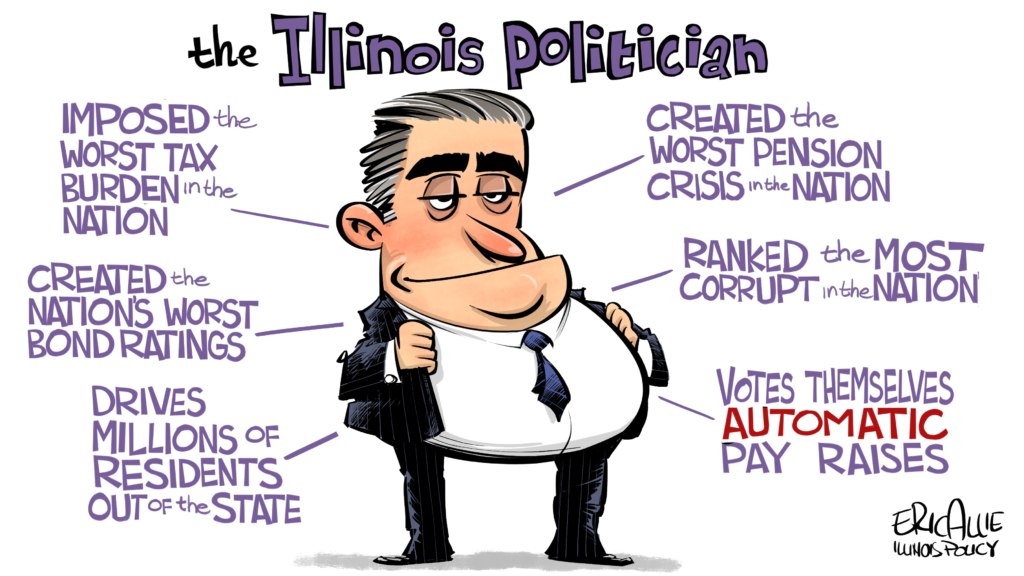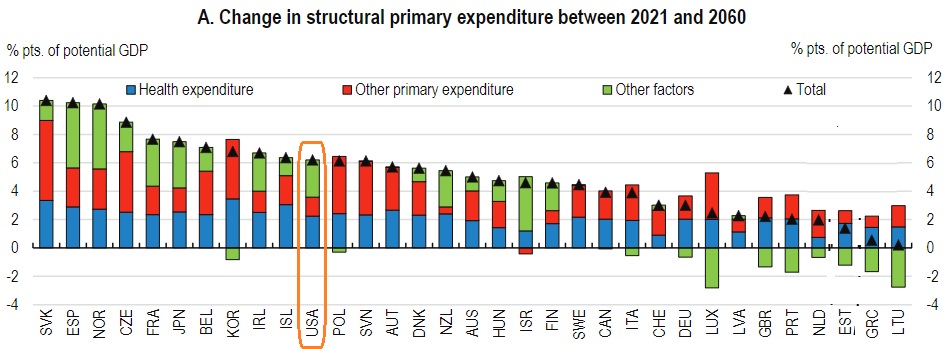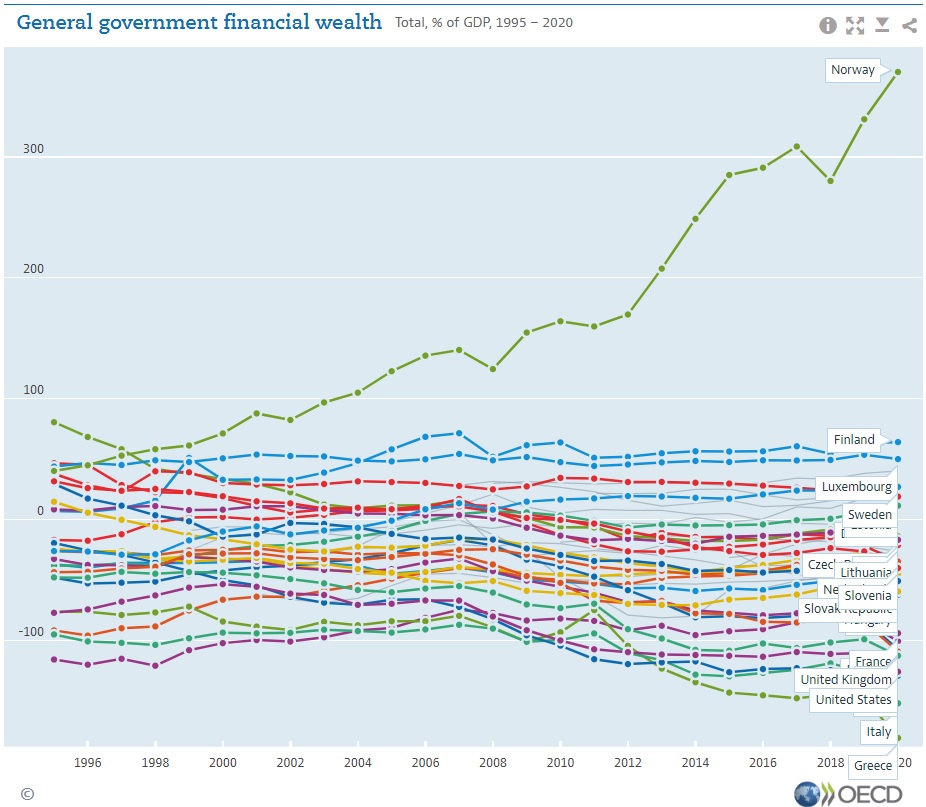–
Which Nation Will Be the Next to Go Bankrupt?
Last month, I shared a chart from a study published by the European Central Bank.
It showed which European nations were in the unfortunate position of facing big future spending increases (the vertical axis) combined with already-high levels of government debt (the horizontal axis).
combined with already-high levels of government debt (the horizontal axis).
The bottom line is that Italy, Portugal, France and Belgium face a very difficult fiscal future.
And Estonia (at least relatively speaking) is in the best shape.
Today we are going to augment those ECB numbers by looking at some data from the OECD’s recent report on Estonia.
Here’s a chart showing how the burden of government spending is going to increase in various nations between now and 2060.
Slovakia, Spain, Norway, and the Czech Republic have the biggest problem.
Lithuania is in the best shape, surprisingly followed by Greece (I assume because that nation already hit rock bottom, not because of good policy).
I also highlight the United States, which will have to face the challenge of above-average spending increases.
But if you want to know which nation will be the next to suffer fiscal collapse, you also need to know whether (or the degree to which) it has the capacity – or “fiscal space” – to endure a bigger burden of government spending.
James Capretta addressed that topic in an article for the Bulwark.
Which governments have exercised budgetary restraint in recent years, even while confronting sequential global crises? Which have been more profligate? And what do the differences portend
for their differing abilities to handle an era when servicing debt may be more expensive than it has been in many years? …Accuracy…requires assessing both assets and liabilities. …The Organization for Economic Cooperation and Development…’s most comprehensive measure of fiscal resilience is the “financial net worth” of the reporting countries, which includes the main sources of accumulated liabilities (especially public debt) along with financial assets owned by governments.
And here’s a chart showing how developed nations (with the exception of oil-rich Norway) have been spending themselves into a fiscal ditch.
Here are some of Capretta’s observations.
Among the twenty-seven OECD countries that reported data every year from 1995 to 2020, the average deterioration in their net financial position, weighted by population size, was equal to 48 percent of GDP. …Several countries stand out for the steepness of their declines. Japan’s net financial position was -20 percent of GDP in 1995, and in 2020 it was -129 percent of GDP—in other words, in just 25 years it worsened by over 100 percent of the country’s annual GDP. Similarly, the United Kingdom experienced a serious deterioration, with a net financial position in 2020 equal to -109 percent of GDP. In 1995, it was -26 percent. …France, Greece, Italy, and Spain are regularly criticized for their uneven approaches to fiscal discipline. The OECD data showing a substantial deterioration of their net financial positions over the last quarter century provides more evidence that each of these countries needs to take further steps to lower the risk of a fiscal crisis in future years.
The United States obviously is not in good shape, though I think the OECD’s methodology is imperfect.
Yes, America will have to deal with a fiscal crisis if we don’t figure out a way of controlling spending, but I suspect many other countries will reach that point before the U.S. (with Italy quite likely being the next to go belly up).
P.S. At the risk of repeating advice from previous columns, genuine entitlement reform is the only solution to America’s long-run spending problem, ideally enforced by a Swiss-style, TABOR-stylespending cap.
Illinoisand Fiscal Suicide, Part I
I wrote a couple of days ago about California’s grim future.
But now I’ll share some good news. No matter how bad California gets, the Golden State probably won’t have to worry  about people and businesses fleeing to Illinois.
about people and businesses fleeing to Illinois.
That’s because the Prairie State is an even bigger mess. If California is committing “slow motion suicide,” Illinois is opting for the quickest-possible fiscal demise.
Politicians in Springfield (the Illinois capital) have a love affair with higher taxes. A very passionate love affair.
But the state’s productive people have a different point of view. More and more of them have been escaping.
And they are now being joined by the state’s most-famous company, as Matt Paprocki of the Illinois Policy Institute explains in a column for the Washington Post.
When Boeing announced last month that it was moving its headquarters from Chicago to Arlington, Va., it sent shudders through the Illinois business community and state capital.
But last week, when the heavy-equipment manufacturer Caterpillar said it was moving its headquarters to Texas, it felt more like a bulldozer ramming into the news. …If you’re an Illinois business owner or resident, as I am, the economics of staying are tough and the enticements to move away are many. …According to the U.S. Census Bureau, last year the state had the third-largest loss of residents due to domestic migration in the nation (-122,460), trailing only California and New York.
It’s easy to understand why people and businesses are leaving.
In 2017, Illinois lawmakers raised the personal income tax rate to 4.95 percent, from 3.75 percent, and hiked the corporate rate to 7 percent, from 5.25 percent. When J.B. Pritzker took office as governor in 2019, he passed another 24 tax and fee hikes costing taxpayers over $5 billion. …With 278,475 regulatory restrictions and requirements — double the national average — Illinois has the third most heavily regulated environment in the country. …Illinois owes over $139 billion in state pension debt as of last year, and local governments owe about $75 billion, which is the primary driver for Illinois’ spiraling property taxes, second-highest in the nation.
Mr. Paprocki offers all sorts of suggestions for reform, including a spending cap.
 But the chances of pro-growth reform are effectively zero. The governor is a hard-core leftist (as well as a hypocrite) and the state legislature is controlled by government employee unions.
But the chances of pro-growth reform are effectively zero. The governor is a hard-core leftist (as well as a hypocrite) and the state legislature is controlled by government employee unions.
So if you’re hoping for a TABOR-style spending cap, there’s little reason to be optimistic.
And if you’re hoping for reforms that will improve the state’s “least friendly” tax climate, don’t hold your breath.
California is the Greece of the USA, but Texas is not perfect either!!!
Just Because California Is Terrible, that Doesn’t Mean Texas Is Perfect
January 21, 2013 by Dan Mitchell
Texas is in much better shape than California. Taxes are lower, in part because Texas has no state income tax.
 No wonder the Lone Star State is growing faster and creating more jobs.
No wonder the Lone Star State is growing faster and creating more jobs.
And the gap will soon get even wider since California voters recently decided to drive away more productive people by raising top tax rates.
But a key challenge for all governments is controlling the size and cost of bureaucracies.
Government employees are probably overpaid in both states, but the situation is worse in California, as I discuss in this interview with John Stossel.
Dan Mitchell Comparing Excessive Bureaucrat Compensation in Texas and California
But being better than California is not exactly a ringing endorsement of Texas fiscal policy.
A column in today’s Wall Street Journal, written by the state’s Comptroller of Public Accounts, points out some worrisome signs.
As the chief financial officer of the nation’s second-largest state, even I have found it hard to get a handle on how much governments are spending, and how much debt they’re taking on. Every level of government is piling up incredible bills. And they’re coming due, whether we like it or not. Even in low-tax Texas, property taxes have risen three times faster than the inflation rate and four times faster than our population growth since 1992. Our local governments, meanwhile, more than doubled their debt load in the last decade, to more than $7,500 in debt for every man, woman and child in the state. In Houston alone, city-employee pension plans are facing an unfunded liability of $2.4 billion. But too many taxpayers aren’t given the information they need to make informed decisions when they vote debt issues. Recently I spent several months holding about 40 town-hall meetings with Texans across our state. Each time, I asked the attendees if they could tell me how much debt their local governments are carrying. Not a single person in a single town had this information.
In other words, taxpayers need to be eternally vigilant, regardless of where they live. Otherwise the corrupt rectangle of politicians, bureaucrats, lobbyists, and interest groups will figure out hidden ways of using the political process to obtain unearned wealth.
P.S. The second-most-viewed post on this blog is this joke about Texas, California, and a coyote, so it must be at least somewhat amusing. If you want some Texas-specific humor, this police exam is amusing and you’ll enjoy this joke about the difference between Texans, liberals and conservatives. And if you want California-specific humor, this Chuck Asay cartoon hits the nail on the head.


